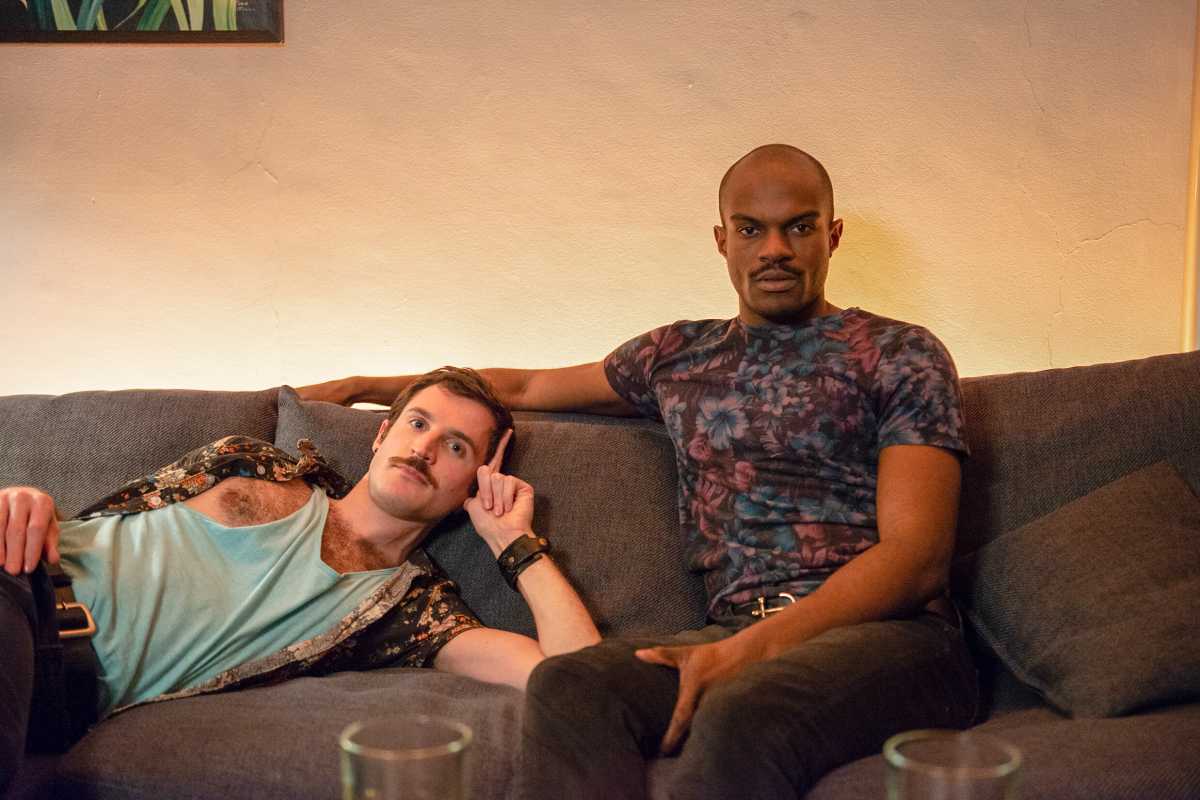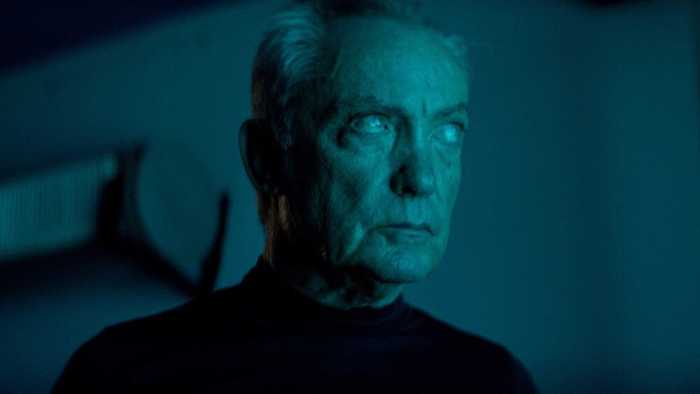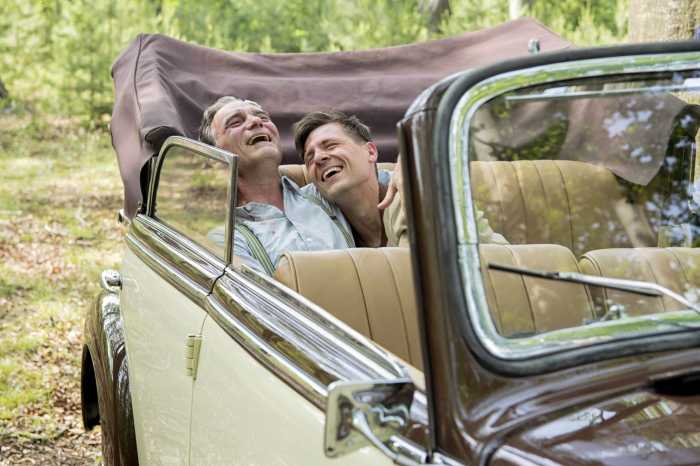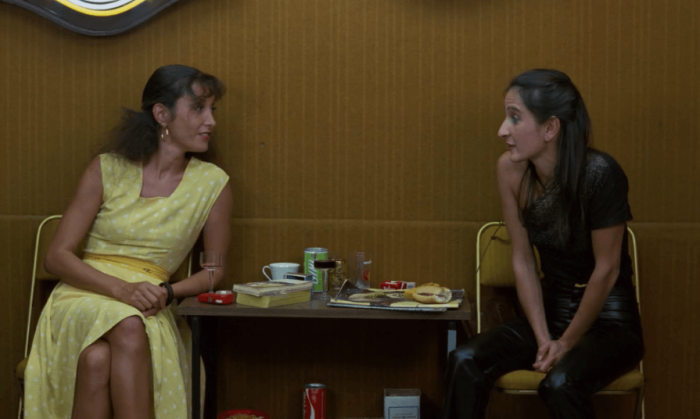Now available for streaming or purchase is the latest entry in the long-running shorts program, “Boys on Film 22: Love to Love You.” The program offers eight great short films from around the world, each featuring gay male characters. The styles, content, and approaches differ from film to film, but each one has something important to say in 10-30 minutes.
The first entry, “Have We Met Before?,” directed by Oliver Mason, is the sole documentary in the program. This British short effectively uses voiceover commentaries from real gay men about their experiences with the hanky code, and cottaging — deemed a political and sexual act by one interviewee — as well as how the internet and apps enable men to meet men. The film recounts both the danger and excitement of these stories through reenactments by two guys, but it also emphasizes the importance of creating a safe space for gay men.
The next film in the program, “The Act,” directed by Thomas Hescott, is also from Britain, and a nice expansion on one of the themes from “Have We Met Before?” This fictional story, set in 1965, has Matthews (Samuel Barnett from “The History Boys”) coupling up with Jimmy (Simon Lennon), a man he meets in the toilets. Matthews wants a relationship — to have dinner or go to the opera with Jimmy — but his working-class lover is not inclined that way. Matthews meets Edna May (Cyril Nri) in a clandestine gay bar as they discuss this one-sided love affair. This short is impeccably well made and acted, capturing the tenderness of the relationship and the harsh times of the era; it is set shortly before homosexuality was decriminalized. As a voiceover recounts attitudes towards homosexuality, Matthew feels guilt and shame, but “The Act” also emphasizes the importance of speaking out.
“First Position,” directed by Michael Elias Thomas, is the lone American entry. Ballet dancer Zachary (Anthony Sorrells) arrives in San Francisco hoping to perform. He meets Jamie (Mark Wax), a choreographer, at a nightclub, and the two begin a professional and personal relationship. However, it is 1982, and AIDS puts a damper on Zachary’s dreams. This poignant short overdoes the melodrama, but emotions are honest and heartfelt. In addition, the brief scenes of dancing are lovely.
“Winter” from Mexico, also features a performer at its center. Co-directors Luis Pacheco and Rafael Ruiz Espejo’s quietly powerful drama has Nico (Pabel Castañeda), a drag queen, trying to manage an unexpected visit from his father (Rafael Ruiz Lizarraga). There is considerable tension between father and son — especially when Nico tries to hide his made-up face from his father one morning. When his dad insists on taking Nico out to a restaurant to talk, Nico resists, but once he finally gives in, their discussion leads to the film’s surprising and poignant conclusion. This is a gem of a short, allowing viewers to fully appreciate these characters and their lives.
“The Suit Weareth the Man,” directed by Mitchell Marion, is the longest entry in the program and the most complex. Told in three parts, it has Maciej (Maciej Nawrocki) hoping to get a promotion at work, but his boss, Christopher (Jack Hardwick) may have an ulterior motive. Maciej’s ambitions are also complicated by his mother, Marta (Katharina Naumow), who is wary of the real estate deal Maciej is developing. Marion uses flights of fancy — Maciej imagines kissing his boss, but also enters a kind of parallel universe in one section of the film — to tell an intriguing story about identity. Maciej wants to be “more than where he came from,” but he code-switches his cultural and sexual identities with drastic results. The film has a series of tonal shifts that will prompt viewers to recalibrate Maciej’s experiences, but this sleek tale of desire is impactful.
“Infinite While It Lasts” is a charming Brazilian import written and directed by Akira Kamiki. Danny (Michel Pereira) meets Seiji (Julio Aracack) at a party and the two guys hit it off. But is there hope for this budding relationship? Danny’s roommate, Arthur (Paulo Ernesto) seeds doubts, and yet, even when Danny reveals to Seiji that he is asexual, Seiji is not deterred. Kamiki creates a real feeling of saudade — which means “longing” — as these attractive guys navigate the possibility of romance.
“Melon Grab,” from Australian director Andrew Lee, has two friends, Corey (Noah Regan) and Jaxon (Noah Fuzi), spending one last day together before one of them moves away. The film is lyrically made, and showcases the guys’ intimate friendship well, but this short is more of a homoerotic bromance than a gay film.
“Boys on Film 22” ends with arguably the strongest short. “Thrive,” directed by Jamie Dispirito, features two beautifully modulated performances as Joe (Taofique Folarin) hosts a morning hookup with Alex (Ben Aldridge) in his flat. The frisson between the two guys is palpable — especially during their sweaty and sticky bedroom encounter. However, when Alex hopes to have breakfast or even a coffee with Joe, there is reluctance. Their post-sex conversation is, in fact, more intimate than what happened in bed, leading to a gratifying moment of catharsis.
“Boys on Film 22: Love to Love You” | Available On DVD, Blu-Ray, and On Demand (on Amazon on PeccadilloPOD.com) on June 27



































